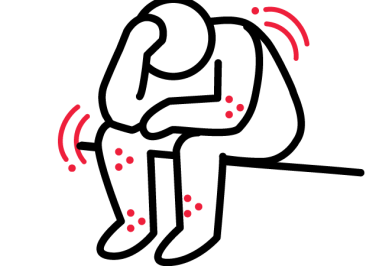What Is Itch?
Image Caption:
“I got depressed. I was suicidal. I couldn’t look at myself in the mirror because I didn’t control who I was. [Eczema] was controlling me.3”
“My partner will have itching/scratching fits that she cannot control, and the helplessness we both feel is both scary and devastating as it can undo a ‘good skin day’ in a matter of minutes.3”
What Is Itch?
Itch is the unpleasant sensation that prompts a person to scratch for relief1. The physiology of acute itching involves the activation of sensory nerve fibers in the skin, which triggers a signal sent to the brain, interpreted as itch. This prompts a motor response to scratch the affected area, ultimately eliminating the itch sensation2.
When the itch persists for 6 weeks or longer, it is defined as chronic1. Chronic itch is common across multiple neuroimmune skin diseases, including prurigo nodularis (PN) and atopic dermatitis (AD). While the etiologies of PN and AD are distinct, in most cases, itch tops the list as the most prevalent problem that patients with AD and PN commonly report. Seventy-nine percent of patients with AD rank itch in their top 3 most problematic symptoms of the disease. In a survey of 30 experts/physicians, 100% reported itch was the primary complaint of patients with PN3,4.
Itch isn't just a physical sensation—it’s a chronic problem in AD and PN that can diminish one’s quality of life. Chronic itch is a condition that impairs self-image, social relationships, intimacy, and sleep3. Some patients with AD or PN endure persistent and unrelenting itch for over a decade, substantially impacting overall well-being5.
Patients with AD and PN experiencing chronic severe itch are more likely to experience anxiety and depression. In some cases, chronic severe itch can lead to suicidal thoughts, highlighting the impact that itch can have on an individual’s mental well-being6,7.
The psychological impact of chronic itch on patients and their families can be significant8. Parents of children with AD have expressed how the condition negatively affects the overall happiness of the entire family8. Family members also experience guilt, anxiety, depression, and disruptions in work performance due to chronic itch3.
In our next article, we will explore the impact of itch on one of the most basic aspects of daily life: sleep.
GL-NAD-2300034
References:
-
Ständer S, Weisshaar E, Mettang T, et al. Clinical classification of itch: a position paper of the International Forum for the Study of Itch. Acta Derm Venereol. 2007;87(4):291-294. doi:10.2340/00015555-0305
-
Lerner EA. Pathophysiology of itch. Dermatol Clin. 2018;36(3):175-177. doi:10.1016/j.det.2018.02.001
-
McCleary KK. More than skin deep. 2020. Accessed October 4, 2023. http://www.morethanskindeep-eczema.org/uploads/1/2/5/3/125377765/mtsd_report_-_digital_file.pdf
-
Pereira MP, Basta S, Moore J, Ständer S. Prurigo nodularis: a physician survey to evaluate current perceptions of its classification, clinical experience and unmet need. J Eur Acad Dermatol Venereol. 2018;31:2224-2229. doi:10.1111/jdv.15107
-
Steinke S, Zeidler C, Riepe C, et al. Humanistic burden of chronic pruritus in patients with inflammatory dermatoses: results of the European Academy of Dermatology and Venereology Network on Assessment of Severity and Burden of Pruritus (PruNet) cross-sectional trial. J Am Acad Dermatol. 2018;79(3):457-463.e5. doi:10.1016/j.jaad.2018.04.044
-
Silverberg JL, Gelfand JM, Margolis DJ, et al. Symptoms and diagnosis of anxiety and depression in atopic dermatitis in U.S. adults. Br J Dermatol. 2019;181(3):554-565. doi:10.1111/bjd.17683
-
Konda D, Chandrashekar L, Rajappa M, Kattimani S, Thappa DM, Ananthanarayanan PH. Serotonin and interleukin-6: association with pruritus severity, sleep quality and depression severity in prurigo nodularis. Asian J Psych. 2015;17:24-28. doi:10.1016/j.ajp.2015.07.010
-
Chamlin SL, Mattson CL, Frieden IJ, et al. The price of pruritus: sleep disturbance and cosleeping in atopic dermatitis. Arch Pediatr Adolesc Med. 2005;159(8):745-750. doi:10.1001/archpedi.159.8.745
